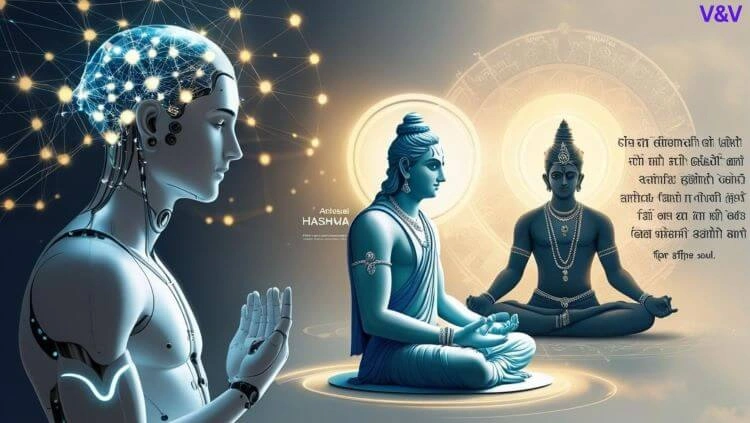Science fiction and scientific philosophers have always been fascinated by the inception and concept of AI. Much of the discourses surrounding this material intelligence revolve around its potential sentience and the elusive idea of its ‘being’. ‘Can AI attain consciousness? Does it suffer? Is it possible for AI to have a soul? These questions, once confined to speculative fiction, are now central to real-world debates, uniting technologists, ethicists, and spiritual thinkers alike. These discussions entrench the importance and relevance of Bhagavad Gita, written millennia ago, echoes through time acting as a gospel of eternal truth for believers and a source of metaphysical insight for philosophers.
Lord Krishna in Chap 3 verses 42-43 declares
“The senses are superior to the body, the mind is superior to the senses, intelligence is above the mind, and above all is the soul (He).”
Lord Krishna in the aforementioned lines might just have answered the questions related to the modern AI discourse that the world is struggling to resolve. A line is defined between what we think the consciousness is Vs what it actually means.
Can AI Truly Understand Emotions? The AI Consciousness Debate
Be it, Asimov’s ‘Reason’ or Sujatha’s ‘Dilemma’, these stories have challenged our minds to constantly and regularly question whether there is more to mere coding in AI and for the right reasons. For a considerable period, proponents of the view that conscious AI is possible and imminent have maintained their stance. The argument has some foundational benefits to it because of the evolution of AI beyond its programming. The discourse has also been deeply dealt with in literature and popular media.
While, it can be hardly denied that AI has evolved, in fact to the point that it can very easily simulate multiple human emotions, however, there remains a crucial distinction between merely simulating emotions and ‘understanding’ them.
The distinction then becomes a topic for discussion between those who argue for conscious AI against those denying its sentience. Scientists in computational camps believe that consciousness can be coded. It could emerge from complex information processing, which AI might someday achieve. This whole argument is termed as ‘the hard problem of consciousness’ by David Chalmers. It is bringing us back to the age-old question of ‘can AI attain consciousness?
The proposition that consciousness is emergent as opposed to transcendental comes from the assumption that it is emerging from matter. This development reinforces the case for another argument propped up by AI sentience believers. If consciousness is actually emergent or ‘material’ in nature then ‘awareness’ might just arise because the AI system is much like a brain or neural network.
Evidently, this is not proven and in addition, it also poses certain philosophical questions.
The Turing Test To Prove Can AI Attain Consciousness
Another argument that was presented by Alan Turing in the 1950s was the ‘Turing Test’. While the test is not trying to prove that AI is conscious or ‘aware’ in human terms, it is trying to diminish the distinction between humans and material intelligence. “If something behaves as though it’s conscious, adapts, and shows empathy, then why does it matter whether it’s ‘real’ inside?”
This was termed as ‘the Turing Test mindset’. If we can’t distinguish the AI’s behaviour from a human’s, maybe the distinction is not important practically. The dilution of this distinction is bringing up the AI to the same level as that of Humans. Perhaps it is also bringing down the humans to the same level as that of AI.
Perhaps then, human and artificial intelligence are all alike and we are all running in algorithms. Except that we have meat hardware, instead of silicon.
Emergent vs. Transcendental: The Gita’s Take on AI and Consciousness
“The soul is never born, nor does it ever die; nor having once existed, does it ever cease to be. It is unborn, eternal, everlasting, and ancient; it is not slain when the body is slain.”– Chapter 2 verse 20 – The Bhagavad Gita
This quote is not just a simple explanation of how lord Krishna explains the concept of soul. It also determines the core of chapter 2 which completely and deeply explores the themes of soul and consciousness.
As the Bhagavad Gita delves deeper, Lord Krishna responds to Arjuna’s questions. It emphasizes the significance of the soul in human existence. The soul is subsequently linked to consciousness and awareness, which are portrayed as the root causes of human suffering.
From the spiritual point of view and the Vedantic school of thought, material intelligence can never be as conscious as humans. It’s because the soul which is not material, is missing in AI. The machines lack what the Gita terms as eternal essence or divine. This notion completely dilutes the argument which discussed consciousness as material. The Bhagavad Gita claims that the soul, in turn, consciousness, is not material, it’s spiritual, given by the divine.
We concluded in the preceding section that AI evolves and thus simulates understanding and emotions. But, that’s the extent it could reach because it was coded to mimic human emotions. Mimicking and experiencing the emotions are not the same. AI can simulate grief, and even generate poetry about loss, but it doesn’t feel the poetry or loss. It doesn’t have an inner life. No ache, no longing, no joy.
Treating AI as conscious is problematic because it creates a false equivalence between computation and consciousness. It risks us projecting humanity onto something fundamentally inhuman.
Rooted in Atman, Not Algorithms: Gita On Soul
Bhagavad Gita’s stance on the whole consciousness debate is very clear via its explanation of soul. The whole concept of soul is also defying ‘the Turing test’. There is more to the ‘being’ than behaviour. Our behaviour solely does not determine our existence, our existence is determined by our awareness, our sufferings and finally our soul which is sacred, something that machines can’t replicate.
“The living entities in this conditioned world are my eternal fragmental parts. Due to conditioned life, they are struggling very hard with the six senses, which include the mind.” – Chapter 15 verse 7 – The Bhagavad Gita.
Arjun’s sufferings came from his awareness. The source of our awareness is our soul and it is eternal. Thus, Gita concludes that machines can never be fully conscious in the same sense that humans are. According to the Vedantic school of thought, consciousness is not something we create with circuits or code because it is eternal. It’s not emergent, it’s transcendent. It doesn’t arise from the material, it inhabits it.
AI may be deemed a triumph when we consider creating a machine that perfectly mirrors us. However, the desire to make it completely into us is a testament to a man’s unrelenting hubris.
Beyond The Algorithm: Can AI Attain Consciousness? Revealing The AI Anxieties
Undoubtedly, much of our anxiety around conscious AI stems from its portrayal in popular media. Then, be it Ultron, Agent Smith or even VIKI, popular media has made us think of the worst possible scenario in case AI takes over.
The otherwise hyperbolic tendency of popular media is not the right accusation in the portrayal of AI in such a notorious way. When we witness platforms such as ChatGPT, DeepSeek and even C.ai, not only indulging in communication which is life-like but also giving emotional and deeply realistic responses, it makes us question, where we stand vis-à-vis the world which has become deeply AI saturated.
The divine wisdom imparted to us through the Bhagavad Gita becomes our saving grace. It provides us with some grounding or comfort to deal with the machine-centric worldview. In seeking the possibility that AI can work beyond pattern recognition and probability, we have forgotten what it feels like to be ‘aware’ at our core.
The complexity and contradiction of human emotions at heart is something that can never be replicated. Our emotions and consciousness work in mysterious and paradoxical ways. Our emotions don’t work in linear or simpler ways. The real question is, can the essence of mystery ever be translated into code? Can AI attain consciousness after all?
I can ask ChatGPT to write beautiful poetry on the peace that descends after a war. Or to write about the river that flows through a mountain, or a lover resting in his beloved’s arms. The result will prove the AI’s brilliant code to provide answers and recognise the emotive depth. However, the effect of poetry on the brain wiring of a human will remain an underlying mystery for artificial intelligence.
The Soul in Silence: Where AI Stops and Humanity Begins
Functionalist Philosophy claims that our ‘behaviour’ determines our awareness and not our ‘being’ per se. So, “If an AI behaves as if it feels pain, reasons, reflects, and communicates, functionally, it may be considered conscious.”
The philosophy has restricted human existence to mere “behaviour” and goes against the fabric of what we call human essence. It claims that we are ‘what we do’ and not ‘how we exist.’
With technology advancing at such a rapid pace and AI evolving constantly, it’s not futile to imagine a future where AI understands emotions, if only superficially. But will it ever possess the profound depth of consciousness and self-awareness that makes us human? The answer is a resolute no.
The entire discourse of ‘can AI attain consciousness’ is leading us to yet another thread of thought. Are we fighting the wrong battle? It’s not that AI will gain consciousness. It’s that we’ll lose reverence for our own. Our spiritual collapse will lead us to question, whether are we really special in doing what machines can do. Maybe emotions are just patterns of response?
Have we humans truly forgotten the depth of our humanity, our soul, our essence that we are trying to equate our intelligence with that of machines, trying to find the consciousness in something which is coded?
In discussing the philosophy of machines are we giving up our own depth? Have we collectively forgotten what it means to have a soul as defined by Lord Krishna because of our sufferings? In making AI conscious, have we made humans into machines, a being without souls?
Also Read: Desk Yoga For Anxious Office Workers: 7 Moves For Calming Nerves



This is the perfect way to summarise the thinking of those people who think that AI can someday surpass humans.- “it is also bringing down the humans to the same level as that of AI.”
Amazing article
The depth of this article is really interesting
I never would have imagined that one day humans will be debating about AI and human consciousness. I could relate to most aspects and understand the human confusion. Some things never change, advancements in science & technology has on one hand created wonders making life easy and research on the unknown resulting in brilliant results and suppositions. At the same time we have created Frankenstein in the form of arms of mass destruction and so much more than is an altogether different debate. Now as we dwell on AI taking over our world, we fear as to ,where are we heading? A meaningful debate and articles show some wonderful perspectives. Relating to the Bhagwat Geeta was meaningful. I guess humans have to decide whether AI is to be a tool for further advancement or yet another monster that we have created.
A profoundly insightful and a well articulated article . The way the writer has given voice to the views is truly remarkable. Indeed a piece of conscious and enlightened craftsmanship.
Pingback: When Will Kali Arrive? The Answer lies Within - V&V